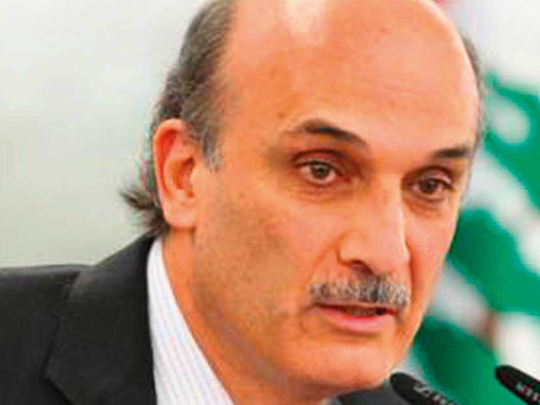
Beirut - The Lebanese Forces, a Christian group with close ties to Saudi Arabia, will join a future cabinet, sweeping away a major hurdle that’s held up formation of a government for six months.
Party head Samir Geagea said his faction’s share of cabinet seats was “the biggest issue” behind the delay. The group will get three ministerial portfolios including social affairs and labour, Geagea said.
Prime Minister-designate Sa’ad Hariri was named in May to form a government following the first parliamentary elections since 2009. The vote gave greater representation to an Iran-backed alliance that includes Hezbollah as well as the two main Christian parties. Their enhanced legislative clout led to demands for greater representation in the cabinet, complicating Hariri’s task.
The Lebanese Forces and Hariri’s allies create a “political balance needed to offset the weight of Hezbollah’s alliance,” said Rosanna Bou Monsef, a columnist for the daily An Nahar.
“A government without the Lebanese Forces would have left Hariri as the face of a Hezbollah-led cabinet, and that would have easily drove away investments the country desperately needs,” Bou Monsef said. “But Hariri would have never accepted that.”
Hariri is expected to meet President Michel Aoun later in the day to discuss possible names for a seat reserved for Sunni representatives not allied with the premier, Hariri-owned Future TV reported citing an unidentified person, the last hurdle to announcing the cabinet lineup.
Lebanon, the world’s third most-indebted country, has been grappling with political deadlock and fallout from the civil war in neighbouring Syria, which has led to an influx of 1.5 million refugees and the closure of vital trade routes.
The cabinet faces the tough task of implementing the structural and fiscal reforms needed to unlock $11 billion in loans and grants pledged by the international community to finance critical infrastructure projects. Earlier this year, Hariri’s previous government committed to lower the fiscal deficit by 1 percentage point annually for the next five years and address rampant corruption.
The World Bank this month halved its 2018 economic growth projection for Lebanon to 1 per cent, citing a sluggish economy, high debt repayment costs, and the abrupt halt to central bank-backed housing loans. The international lender said the country’s debt-to-GDP ratio remained on an “unsustainable path.” Public debt will likely reach 180 per cent of GDP in five years from 150 per cent in 2017, the International Monetary Fund said.
Lebanon is also facing a set of political challenges as the US increases pressure on Iran through sanctions, in the process targeting Tehran’s Lebanese proxy, Hezbollah, which has fought alongside government forces in Syria’s civil war.












